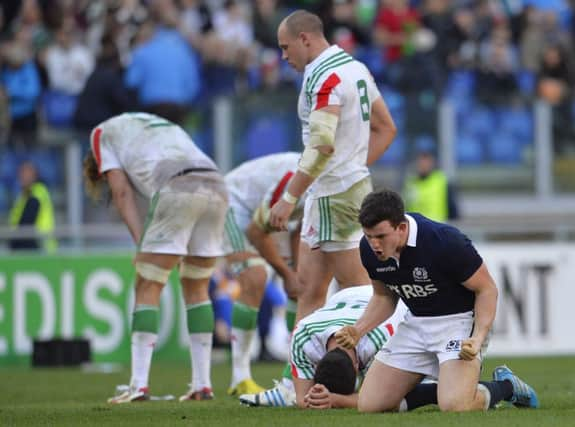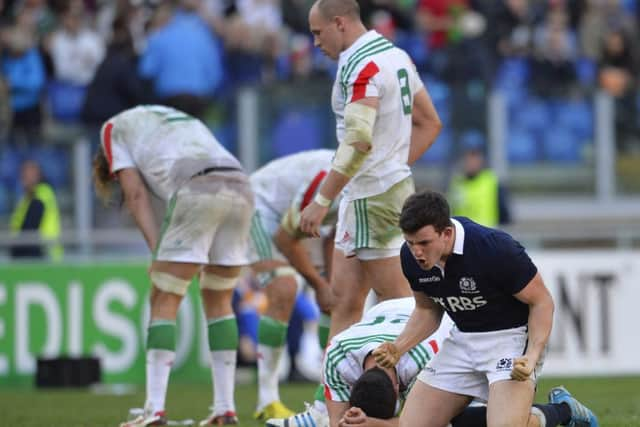Dark cloud lifts as Scotland kick losing habit


Held up as the ‘Holy Grail’ of the RBS Six Nations Championship as every coach underlines the importance of a good start, momentum has rarely figured in Scotland’s lexicon and so Scotland have rarely featured in title talk.
Scott Johnson’s squad headed to Italy on the third weekend of the tournament under a dark cloud of national strife with every player, coach and SRU official feeling the heat of a rugby community’s spitting invective in the wake of defeat to England.
Advertisement
Hide AdAdvertisement
Hide AdEven at half-time in the impressive Stadio Olimpico the players trooped down the tunnel with the skies above them a glorious blue but that nasty cloud of pressure following them into the dressing room. They were behind 13-3 on the scoreboard, and not only that but the 20-year-old fly-half Tommaso Allan, who had turned down Johnson and the nation he represented at age-grade level, was proving to be Italy’s destroyer-in-chief with a try, conversion and two penalties blowing wind into the Azzurri sails.


But then Scotland found momentum. It was not obvious in the first half as regular scrum collapses led to the withdrawal of tighthead Moray Low before half-time, and a rattling-up of penalties against the Scots, but the foundations had been laid. It was clear in a perfect Scottish lineout display, with Jim Hamilton stealing Italian throws and combining with new hooker Scott Lawson, Richie Gray and Ryan Wilson, and the strengthening of a resolve that this was a game they could win.
It built in the third quarter as Italy’s grip on possession and territory withered and surfaced brilliantly in one of the most exciting denouements Scottish supporters have witnessed for some time.
Where did the momentum come from? Work-rate, skills and game understanding are the simple answers. Just squeezing into the world’s top 20 nations in terms of playing numbers, Scotland has rarely produced the breadth of player that possesses the power, pace and handling skills to create momentum on his own.
Big, bruising No 8 David Denton lost his place in the team because despite showing the power to rock England back on their heels, he struggled to be effective in others areas of the Calcutta Cup match.
Johnnie Beattie came into the back row, Richie Gray to the second and Scott Lawson took over at hooker from Ross Ford – Beattie and Lawson smaller than the men they replaced, and Gray bigger but supposedly with a poorer work-rate. All three justified the changes with fine, hard-working displays as part of a tireless Scottish forward effort that overcame the scrum problems and a very strong Italian pack, not least due to replacement tighthead Geoff Cross proving talk of his retirement to be premature.
However, that was only ever likely to be the foundation against an Italian squad with a far superior defensive shape, confidence and skills than was the case five years ago. Scotland required to build something tangible on top of that.
We said in Saturday’s preview that while the talk rightly centred on the battle of the packs, and whether Scotland’s scrum and lineout could improve, the crucial factor in determining the outcome of the game would lie with the young midfield combinations. Who would stand up, grab the bull by the horns and create winning points? The Italian stand-off and centres, the lads in the ten and 12 jerseys both just 20 years old, or the Scots, aged 22, 23, and 23 respectively in the ten, 12 and 13 tops?
Advertisement
Hide AdAdvertisement
Hide AdItaly and Allan cruised the early momentum of the scrum dominance to build an interval lead, but when the chips were down and defeat looming again, the Scots rose to the challenge to dominate the second. It was far from perfect.
Weir will be cursing his poor decision on a counter-attack in the first half to run into trouble when he had Sean Lamont in space to his left with a try beckoning, Matt Scott and Dunbar messed up an opportunity when Greig Laidlaw took a quick tap-penalty as the Scottish momentum built past the hour-mark and the centre duo missed tackles in the lead-up to Italy’s try in the 70th minute that threatened to ruin Scottish hope late on.
But, just as we stated on Saturday that this was not a game for shrinking violets, all three bounced back up, kept faith and, surfing the momentum generated by their teammates in the second half, showed the quality of skills and composure to produce the finish that earned Scotland its first win in Italy in eight years.
It is worth noting also how the tries and match-winning drop-goal came about, firstly because Scotland have scored so few tries of late that lessons have to be learned and, secondly, because amidst all the hype around Dunbar’s brace and Weir’s exquisite drop-goal it is easily forgotten that their opportunities owed much to the sharp decision-making and execution of others.
Scotland had struggled to break the Italian defence with orthodox attempts to ignite momentum before they exploded onto a turnover chance for the first score in the 67th minute. Laidlaw, Gray and Denton forced Italy scrum-half Edoardo Gori out of an attempted clearance, Weir’s tackle dislodged the ball from the scrum-half and Ryan Grant pounced on it.
Laidlaw found Cross and instead of putting his head down and charging, the prop passed right to Lawson. The hooker has always been a good ‘footballer’ and he fed Scott outside him. The centre superbly straightened up, halting the drift of two defenders, and then found Stuart Hogg steaming up on his right.
The full-back similarly straightened for a second, enough to hold two defenders again, and so when he fed Dunbar the centre had a space to attack. When through Dunbar’s pace did the rest and Allan could not stop his dive to the corner.
Had Cross not passed, Lawson not delivered a slick ball to Scott, neither Scott nor Hogg straightened but instead hurried the pass, that crucial first try – in the championship for Scotland – would not have been scored.
Advertisement
Hide AdAdvertisement
Hide AdThe second was arguably better because it came from the training field. Off a scrum on halfway, Scott ran a dummy line and Chris Cusiter, on for Laidlaw, fed Sean Lamont, who – typical of a storming performance – steamrollered Allan at stand-off. Cusiter and Dunbar provided options on either shoulder, and he chose Cusiter.
The scrum-half was caught by Parisse, but had Dunbar on hand and fed the centre, albeit with a hint of a forward pass. Scott was in support as Dunbar burst towards the Italian 22, crucially, because it forced young wing Angelo Esposito to drift towards him ever so slightly, leaving the flying Dunbar with a one-on-one with Luke McLean that the Italian full-back never had the stomach for.
The support play and timing of each pass was vital to the score, and Dunbar and Scott’s ruthless approach summed up the ambition coursing through the young midfielders. Italy came back and exploited weak tackling with a fine Josh Furno try, underlining their improved quality, but then came Weir’s moment.
The Scottish pack built the platform, Denton reacted to a wheeling scrum to break and claim the loose ball, Lawson stepped in at scrum-half for Cusiter, Scott drove ball up when there were no forwards to carry, and Cusiter delivered an exquisite pass from the base of the ruck which Weir snatched, dropped and struck a majestic kick high and straight over the Italian defenders and between the very top of the uprights.
Quality skills from Denton, Lawson, Scott, Cusiter and Weir, and others, at a key moment under pressure.
Johnson, and Andy Robinson before him, have been candid about the failings of the Scotland squad, but also insisted to the point of ridicule that they believe these players to be capable of rugby to compete with the best when they execute plans properly. Johnson stuck by Weir when many were calling for a change at ten, and the young Glaswegian repaid his faith on Saturday, as did others.
It was close and far from a perfect performance, while the heavy defeat suffered by the under-20s in Italy and losses for Edinburgh and Glasgow over the weekend keeps Scottish rugby’s development system firmly under the microscope.
But in Rome on Saturday, Scotland’s elite players began to deliver on their promise of Test-quality skills and execution and they could find a capacity Murrayfield crowd helps to build momentum in a reinvigorated championship.
Advertisement
Hide AdAdvertisement
Hide AdA France team with one win and struggling for inspiration will still prove to be a major test for this squad, but, for a change, Scots hope has sprung from the ‘Eternal City’.
SEE ALSO: